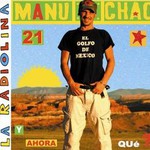La Radiolina
Studio Album by Manu Chao released in 2007La Radiolina review
Global citizen
A musician doesn't have to be popular in USA and sing songs in English to become prominent allover the world and such person as Manu Chao stands as the best evidence to this statement. He is one of the brightest representatives of the world music; he is a true poet of streets, honest, good-natured and accessible to any person. Manu Chao is a global citizen in the direct sense of this phrase. English is just one of many languages Manu Chao speaks and sings in, and it comes much further down the list that includes French, Spanish, Portuguese, Arabic, Galician and even Wolof, a language, which is used in some countries of northern Africa. Many of his admirers can't even tell for sure who Manu Chao is by origin, some think he is from Argentina, and others consider him Portuguese. And this is no wonder because Manu Chao is related to the world like nobody else. He was born in Spain, raised in France and used to travel across Central America as a wondering nomad. And of course it all received its reflection in his songs. Manu's musical style includes reggae, ska, rock and salsa and his lyrics are frequently colored in political tints.
Multilingual Manu
Manu Chao is not well known in Northern America but the albums he recorded with different bands and his solo discs made him a huge star in Europe and especially in Latin America. La Radiolina is his third solo album. On a big scale this record doesn't bring anything cardinally new – this is just that record you could expect from this performer. Stylistically, La Radiolina is executed in the typical Manu Chao vein. He continues mixing different genres starting from punk rock to Latin American guitar strumming. The songs are mainly sung in Spanish but of course the album features lyrics in other languages too, however, there are not so many non-Spanish songs here. Politik Kills, Rainin In Paradize, The Bleedin Clown are preformed in English, Besoin De La Lune и Panik Panik in French, Amalucada Vida in Portuguese and A Cosa in a new for Manu Chao Italian. His love for re-utilizing of the same musical backing themes also remains unchangeable. Thus, for example, he uses the same, but differently arranged, theme on Rainin In Paradize, El Kitapena, Panik Panik, Siberia and Mama Cuchara. However, each tyme he invents new lyrics and vocal melodies. This songs feature a pretty pushing character, intensive tempo and even overloaded guitars, which is not really typical for Manu Chao's solo albums.
All-triumphant optimism
In fact, the main difference of La Radiolina from Manu Chao's previous albums lies in a livelier and more cheerful character of the songs. Of course, he never loved sad melodies but while many of his previous songs sounded very lightly and sometimes too simply his new material shows preference to massive and more solid sound. La Radiolina's atmosphere looks more like Manu Chao's live shows – loud and brisk like carnival in Rio de Janeiro. Listen to El Hoyo, this is a really festive song. Besides, he uses slightly distorted guitars and punk rock bass frequently indeed. But fans of Manu Chao's famous song Bongo Bong have nothing to worry about; the album is well equipped with unhurried songs too. Such tracks as A Cosa or Otro Mundo can be referred to this category. But again, the album's main disadvantage is Manu Chao's tendency to use the same backing themes. It sounds good, fresh and even interesting when he uses different arrangements but it really annoys when he doesn't even bother to change a single instrument. And even new vocals can't save the situation. Such songs are really few in number but it spoils the general impression. But overall, La Radiolina is sufficiently interesting album. If you always loved Manu Chao's tunes for their good-natured and merry character than it surely won't disappoint you, the more so because in the terms of good mood and ardor La Radiolina may leave both of his previous albums in the dust. And in fact, the main thing is that Manu Chao is here again, musical innovation is not his lot nowadays, all-triumphant optimism – that's the main quality of his music.

